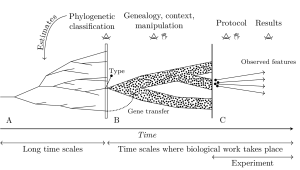
Measurement in biology is methodized by theory
Biology & Philosophy
We characterize measurement in biology from a theoretical perspective with a focus on historicity. We analyze experimental strategies and reproducibility.
Abstract
We characterize access to empirical objects in biology from a theoretical perspective. Unlike objects in current physical theories, biological objects are the result of a history and their variations continue to generate a history. This property is the starting point of our concept of measurement. We argue that biological measurement is relative to a natural history which is shared by the different objects subjected to the measurement and is more or less constrained by biologists. We call symmetrization the theoretical and often concrete operation which leads to considering biological objects as equivalent in a measurement. Last, we use our notion of measurement to analyze research strategies. Some strategies aim to bring biology closer to the epistemology of physical theories, by studying objects as similar as possible, while others build on biological diversity.
Keywords: measurement, evolution, experiments, strains, symmetry, systematics



